Question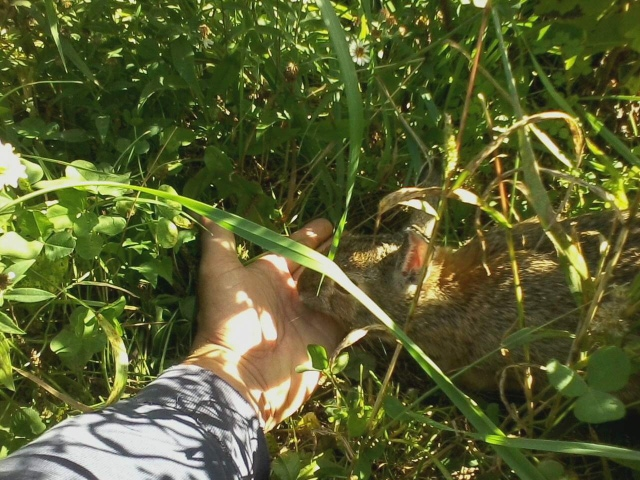 Feeding Lilly
Feeding Lilly
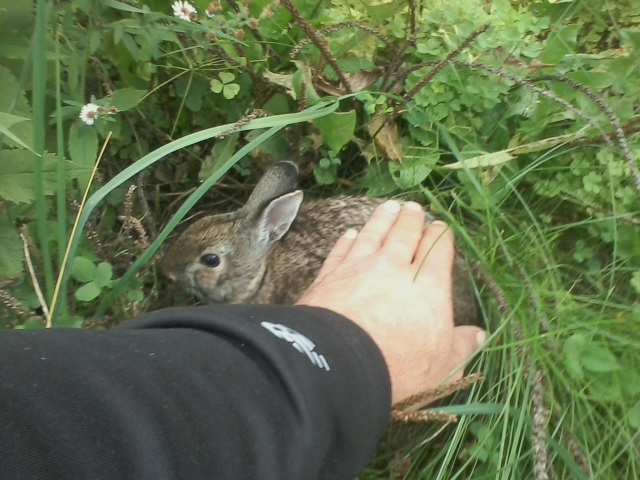 Petting Lilly
Petting Lilly
QUESTION: I have befriended a wild rabbit (I call her Lilly). She likes to eat apple out of my hand and a few things that grow wild around here. With winter approaching I would like to find a few different things I can give her as a treat that I can find at the grocery store. She doesn't seem to want anything store bought besides the apples. I would appreciate any suggestions you have that I may not hav thought of.
ANSWER: Hello Tim,
"Wild rabbits" are a different species of lagomorphs than their domestic cousins. I am not sure where you are but Lily appears to be a cotton tail. (Her head shape is slightly off, and her ears look a little short but the pictures arent very clear. It is possible that she is an abandoned domestic rabbit with agouti coloring.) Is it possible for you to get clearer pictures of her? I would be most interested in pictures of her head and ears as well as of her body type when she is alert (and not being pet). It is very uncommon for a cottontail to approach a human, which is why I am wondering if she is an abandoned domestic rabbit. They do come in agouti as well!
Honestly, my first suggestion, if she is a cottontail, would be to admire Lily from afar and not feed her. Teaching wild animals to approach humans for food often results in injured or dead wild animals.
However if you do wish to continue feeding Lily, I would discontinue the apples and other fruits as well as high sugar foods such as carrots, and leave offerings of timothy/alfalfa hay and fragrant herbs and greens such as parsley, cilantro, basil, honeysuckle, red and green leaf lettuces (never iceberg) and mint.
If you can get additional pictures of her id be happy to see them!
---------- FOLLOW-UP ----------
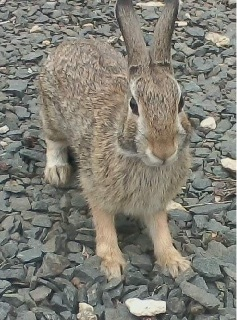 Lilly stopping for a p
Lilly stopping for a p 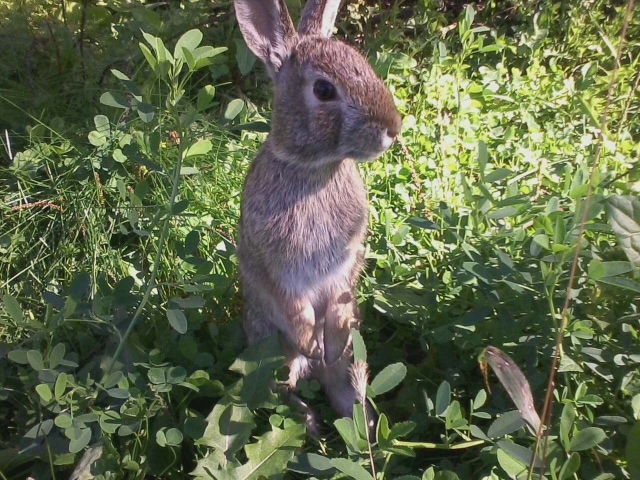 On alert
On alert
QUESTION: Thank you for your prompt reply. I am in St. Paul Minnesota and I believe she is a cottontail. I would love to keep her as a pet but I assume she would be better off in the wild. I'm in a residential area with no hunting so my biggest concern for her is cats and dogs. I have not tried to pick her up to confirm that it's a female but her chest hair is getting thicker so she could be pregnant or it could be her winter coat. I am far from an expert on rabbits. I know it's late in the year for her to have babies but people have reported ducks laying eggs this fall and another rabbit must have had a litter this past week because she was so big she was hopping a bit funny. I have attached more pictures and if there is an angle that would help you determine if she is a cottontail I should be able to get a picture if I see her when its light enough. The winters are cold here so if you have advice on how to help her or any babies make it through I would appreciate that also.
AnswerYes, she does indeed appear to be a cottontail. I would not attempt to pick her up. If it is a doe, and she is pregnant (which would indeed be very unusual at this tme of year) there isnt anything you need to do for the babies. Rabbits burrow very deep and line their nest with lots of warm hay and grass. Nests can easily survive below zero temps. They are very good at staying warm!
I would also be concerned about predators. The best advice I can give you if you do decide to keep feeding her is not to leave food for Lily in the same spot every day so that her scent doesnt stay around too long. If you know for instance that there is a particular section of yard she enjoys, leave food in a different part of that section each time to help disperse her scent. Remember, avoid sugary treats which can cause health problems. Clean grass hay and fragrant herbs will be a welcome treat.
Also, if she does have babies, know that mother rabbits only visit the nest twice a day to feed. This keeps their scent away from the babies and helps draw predators away. Please dont assume she abandoned the babies because she isnt around. Babies will also leave the nest at about 3 weeks and will be independent, if their eyes are open they can be on their own, it is best not to touch them.
Good luck!





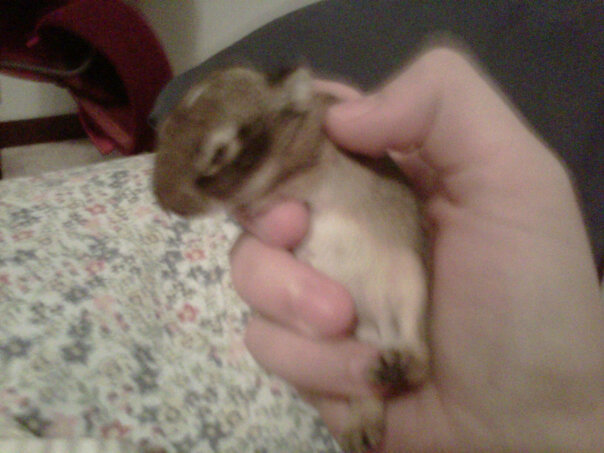 BABY RABBIT DYING :(
Question
molly
I found a baby bunnie about 6 days ago,
BABY RABBIT DYING :(
Question
molly
I found a baby bunnie about 6 days ago,
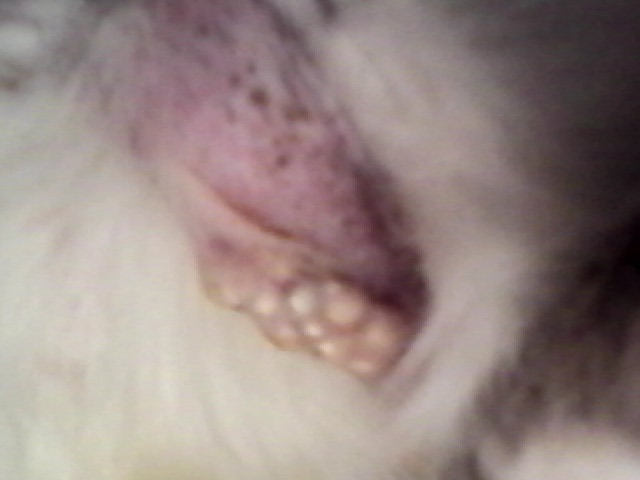 Scrotal Bumps
QuestionQUESTION: Dear Dr. Krempels,
i was just holdin
Scrotal Bumps
QuestionQUESTION: Dear Dr. Krempels,
i was just holdin
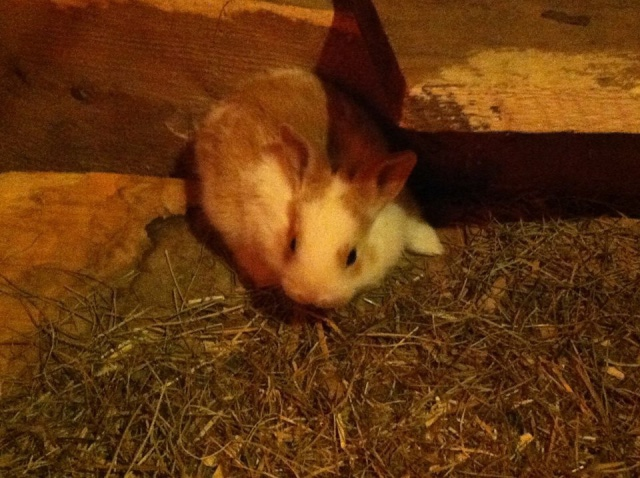 Help!! Can a Rex rabbit survive a Vermont winter?
Question
Rex rabbit (baby) Rex rabbit #2 (baby) &
Help!! Can a Rex rabbit survive a Vermont winter?
Question
Rex rabbit (baby) Rex rabbit #2 (baby) &
 I hit/spank my rabbit
QuestionQUESTION: Hey Dr. Krempels,
I have this habit o
I hit/spank my rabbit
QuestionQUESTION: Hey Dr. Krempels,
I have this habit o
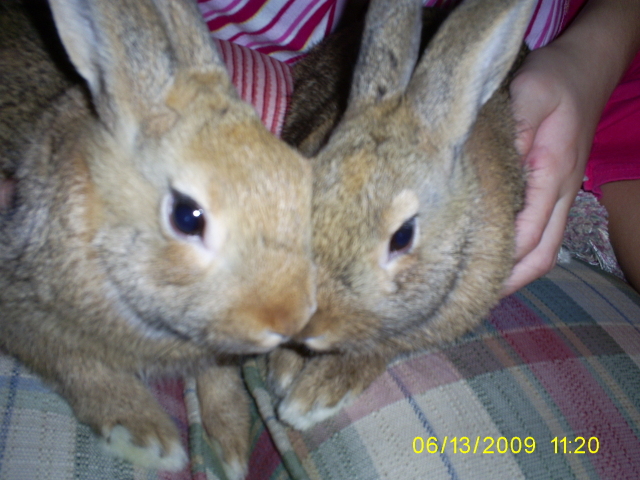 aggressive pregnant doe
QuestionQUESTION: Our doe has always been loving.
aggressive pregnant doe
QuestionQUESTION: Our doe has always been loving.